Content
Peony Nick Shaylor is a popular representative of the milk-flowered peonies, famous for their delicate pink flowers. The cultivar is highly regarded for its large, fragrant buds and resistance to harsh environmental conditions. It is also popular because of its unpretentiousness and ease of care.
Description of peony Nick Shaylor
The Nick Shaylor milk-flowered peony is a perennial plant in the peony family that can live up to 50 years. The group of varieties was named "Milk-flowered" because the first peonies of this section, which were still wild at that time, had milky-white flowers. According to the main classification, all species of this group belong to herbaceous peonies.
The plant has strong stems that can firmly support the weight of large flowers. On it are densely arranged dark green leaves, elongated in shape. The bushes are sprawling, at the end of flowering they look good because of their carved foliage. The height of "Nick Shaylor" reaches 90 cm. Closer to the inflorescences, the foliage thins, its bulk is concentrated on the lower half of the plant.

"Nick Shaylor" - the best garden and cut variety of late blooming peonies
The main advantage of Nick Shaylor's milk-flowered peonies is the large double pink-shaped flowers. On the large pale pink petals, you can sometimes see streaks and streaks of crimson color. In the center of the bud there are yellow stamens, but behind the dense petals they can hardly be seen.
Florists note the unpretentiousness of the plant, which lies in its drought and frost resistance. It is easily taken and grows quickly into sprawling shrubs.
In Russia, they are best suited to territories from Arkhangelsk and to the south, but with proper preparation for winter, they can be grown in colder regions. With good care, Nick Shaylor can withstand temperatures down to -37 ℃.
Flowering features
The variety belongs to the groups of large-flowered, double, pink and herbaceous peonies. Flowering is later, begins at the end of June and lasts only about 10 days.
The most common color of the Nick Sheilor variety is pale pink. Sometimes a lush flower smoothly changes its color from the periphery to the center: large petals at the edges are milky white, and small ones in the center of the plant are soft cream. The diameter of each flower reaches 20 cm, there are 7-12 of them on one plant.
At first, the central buds bloom, they are the largest on the bush. Then lateral flowers are formed. To form a lushly blooming peony, the central buds are cut off immediately after wilting, after which the lateral ones develop in full force, and the bush blooms for a long time and magnificently, forming new buds.
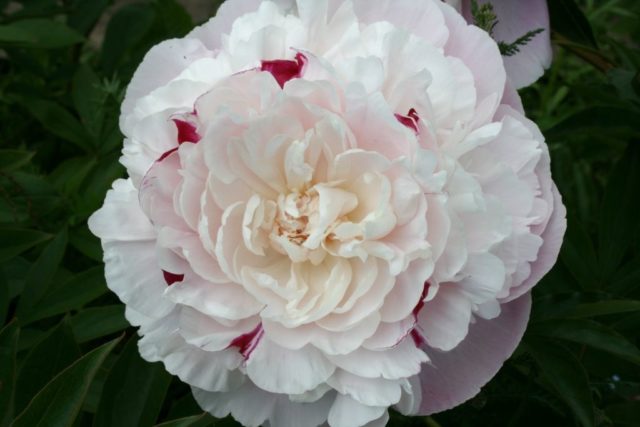
Flowers are especially expressive, on which crimson veins appear.
The special charm of Nick Sheilor peonies is given by bright red veins, which stand out sharply against the background of the main soft shade. True, such strokes do not appear on all bushes. But always from peonies comes a strong delicate aroma.
Application in design
Nick Shaylor is used in a wide variety of landscape compositions. If the idea is to use only peonies, then varieties with different flowering periods are selected. Alternately replacing each other, they retain the decorative effect of the composition for up to several months. With other types of flowers, "Nick Shaylor" also goes well, usually used roses, irises, phlox or astilba.
Herbaceous peony Nick Shaylor can be combined with tree varieties. The differences between the species create a dramatic contrast that looks great on alpine slides or rockeries.When combined with other herbaceous peonies, you can create a beautiful landscape due to varieties with flowers that are similar in shade.
Combinations with dwarf conifers and shrubs have proven themselves well. Among the latter, a very wide selection is now offered: from small cone-shaped thujas to blue dwarf spruces and globular pines.
Peonies "Nick Shaylor" will add splendor and structure to compositions such as:
- flower beds;
- alpine slides;
- track design;
- glades;
- framing terraces.
It is possible to use "Nick Shaylor" as beautifully flowering individual plantings.
Reproduction methods
The vegetative method is the only one to propagate Nick Shaylor peonies. It is carried out using layering, root cuttings or dividing the bush. The latter is used most often because it is simple and gives good results. Seed propagation is rarely successful for Nick Shailor peonies.
Nick Shaylor peony can be divided in two ways: with partial or complete digging of the plant. Digging the bushes is fully recommended for younger peonies, and an incomplete digging is used for old large plants, this will help to rejuvenate them.
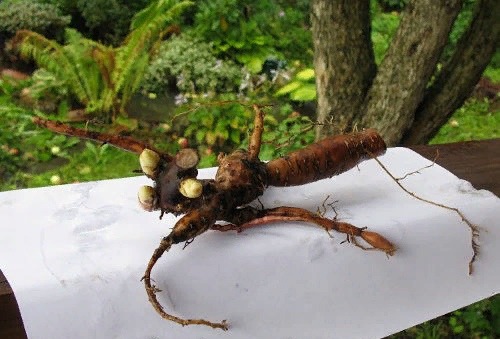
"Delenka" is cleaned of rotten roots and cut to 18 cm
For a complete excavation, the stems are cut with a pruner to a height of 10 cm. After that, the bush is removed from the ground, washed with water under pressure from the mud and a "cut" is obtained from it. With partial digging, a suitable sector is selected, a trench is dug on one side of the plant and the soil is removed from the roots.
Further, in both cases, a piece of rhizome with several stems is cut off, the cut site is allowed to dry for a couple of days, and then covered with a mixture of compost and earth. The old rotten roots should be removed from the “delenka”, and healthy ones should be shortened to 15-18 cm.
Landing rules
The choice of where to land for the Nick Shailor is very simple. The main thing is to make sure that it will not be shaded by a wall, trees or shrubs. In addition, the latter can deprive him of water and nutrients. When planting bushes near paths, you need to retreat enough space, otherwise it will get in the way when it grows.
Planting times differ depending on the method of obtaining the "parcels". Purchased peonies in bags are planted from late April to May. Purchased in containers are planted until mid-summer, and if "delenki" are obtained on their own site, then it is better to start breeding peonies in August.
The depth of the pit for peonies should reach 60 cm. Between several bushes it is necessary to maintain a distance of a meter. A prepared mixture of humus, black soil and crushed clay is poured into the planting pit. To get the plant better, you can add wood ash and superphosphate there. Fill the hole with this mixture so that about 12 cm remains to the brim.
In the center of the planting pit, you need to fill in a small mound and install a "delenka" on it. The roots are carefully covered with earth so that the buds are at a depth of 3-6 cm from the surface of the earth. This is a very important point, because a peony may not bloom if the correct depth is not observed.
Now the future bush needs to be watered, add more earth and mulch. Mulch in a layer of several centimeters is made from sawdust, moss or non-acidic peat.
In the first two years, it is recommended to remove the flowers, or at least most of them. This way you can stimulate the better development of peonies, and the flowers in the future will be more magnificent and brighter. Otherwise, the plant will spend reserves of nutrients from unformed roots for the formation of buds.
Follow-up care
Nick Shaylor peonies are not the most demanding flowers, but without proper care they will be far from their ideal shape. The flowers become small and dull, the bushes are not spreading, and the stems are weak. Therefore, it is necessary to create an optimal agrotechnical background for the plant.
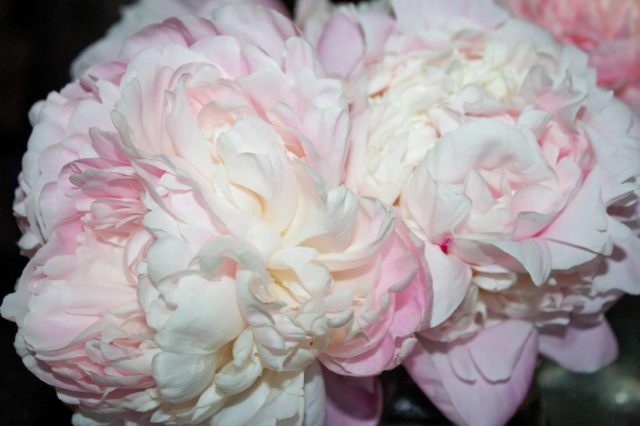
The decorativeness and longevity of peonies depends on proper care.
Peonies are very moisture-loving and require weekly watering.During dry periods, you can moisturize your plants even more often. It is especially important not to deprive the plants of moisture during the budding period and the laying of new buds for the next year, this happens immediately after flowering. For one watering, several buckets are poured under each bush. It is impossible to wet the leaves and stems, as this can lead to the appearance of putrefactive diseases. If you wet the flowers, the petals will blacken and fall off.
You need to feed "Nick Shaylor" with fertilizers with a high content of phosphorus and potassium. These are complex mineral dressings that are carried out in the spring. For each bush, you need to pour half a glass of fertilizer.
Peonies are very fond of spring mulching. Most often, mowed grass is used as mulch, which quickly decays with the formation of vermicompost. Moss and sawdust are also suitable, especially if the plant is sick, because then it is better not to use organic matter for mulching.
You need to loosen the soil under the peonies carefully, trying not to hurt the growth buds. Deep loosening can be applied only at a distance of 15 cm from the stems and pains. This procedure helps to retain moisture, increase oxygen availability and prevent weed growth. Loosening is carried out after heavy watering or rains.
Preparing for winter
The first step in preparing for winter is pruning the bushes. "Nick Shaylor" is pruned at the end of September, but if, upon examination of the leaves and stems, it turned out that they wilt badly, then the procedure can be performed a little earlier.
It is recommended to fertilize the peonies shortly before pruning. Phosphorus, potassium, bone meal and wood ash are suitable for autumn feeding. But nitrogen fertilizers in the fall are not suitable for use, since they stimulate the growth of leaves and stems.
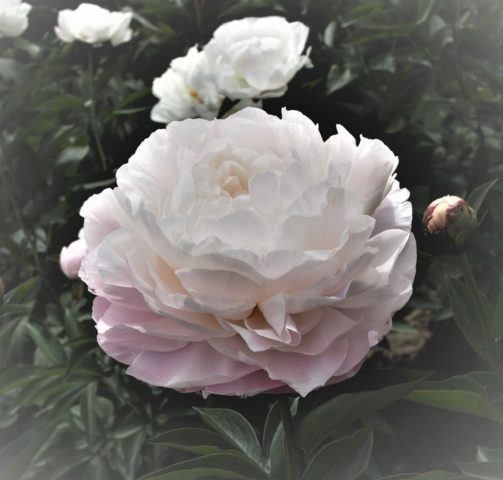
After fertilization, peonies are pruned in autumn.
You need to cut peonies at the very root, although some still leave 2-3 cm of the stem above the soil level. The cut tops must be burned or removed from the site, since in the future this can become an optimal environment for the growth of parasites that threaten the health of peonies.
It is necessary to cover peonies "Nick Shaylor" for the winter only in very cold regions, as the plant is frost-resistant. Before that, it is advisable to mulch it with a layer of sawdust 5-10 cm.Organics or cut stems of peonies are not suitable for this, it is important to take into account in order to exclude pest infestation. On top of the mulch, the plant is covered with spruce branches.
Pests and diseases
Of the pests for peonies, botrytis, which is also called gray rot, is dangerous.
The causes of the disease can be:
- rainy, cool summer;
- acidic soils with poor aeration;
- mulching with tops cut from a peony.
Manifestations of gray rot are bright and difficult to miss. The buds turn brown and stop developing. Brown spots cover the stems and leaves, drying out and dying off begins.
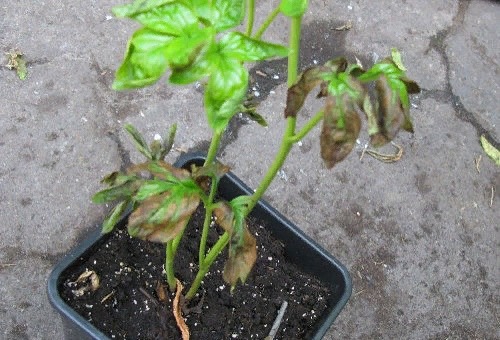
Brown spots are a characteristic feature of Botrytis
When gray rot appears, the plant must be treated with "Hom" or "Abiga-Peak". If this does not help, then the peony will have to be cut off completely, and the remains should be burned with brilliant green or "Vitaros". The most important thing is to prevent the spread of gray rot to the root.
Conclusion
Peony Nick Shaylor due to spreading bushes and pale pink flowers is able to decorate any flower garden. Its unpretentiousness and ease of care allow it to be kept almost everywhere. With the right approach to cultivation, you can extend the life of a flower to 50 years. It is enough to pay a little attention to "Nick Shailor" to get healthy bushes with large fragrant buds.
Reviews about peony Nick Shaylor








